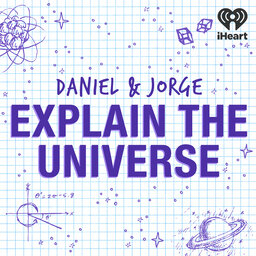The most common listener questions!
Is there dark matter in black holes? Are gravitons and gravitational waves the same thing? Daniel and Jorge answer the most common listener questions!
Learn more about your ad-choices at https://www.iheartpodcastnetwork.com
See omnystudio.com/listener for privacy information.
In 1 playlist(s)
Daniel and Jorge Explain the Universe
A fun-filled discussion of the big, mind-blowing, unanswered questions about the Universe. In each e…Social links
Follow podcast
Recent clips

Fall equinox listener questions
19:36

Summer solstice listener questions
20:10

Spring equinox listener questions
20:41
 Daniel and Jorge Explain the Universe
Daniel and Jorge Explain the Universe